Table of Contents
- 1 What is Analysis of Transactions?
-
2 Complementary Transactions
- 2.1 Adult-Adult Transactions
- 2.2 Adult-Parent Transactions
- 2.3 Adult-Child Transactions
- 2.4 Parent-Parent Transactions
- 2.5 Parent-Adult Transactions
- 2.6 Parent-Child Transactions
- 2.7 Child-Parent Transactions
- 2.8 Child-Adult Transactions
- 2.9 Child-Child Transactions
- 2.10 Non-Complementary Transactions
- 2.11 Ulterior Transactions
- 3 FAQs Section
What is Analysis of Transactions?
Transactional Analysis is a method for examining the nature of interpersonal communication between two individuals and analyzing its effectiveness. Every conversation is treated as a transaction. For example when A talks to B, it is one transaction and when B replies to A, it is another transaction.
Each transaction of an individual emanates from the parent’s ego, adult ego, or child’s ego state. As stated earlier, the parent ego state (P) is authoritarian, the adult ego state (A) is rational and logical in approach and lastly, the child ego state (C) is impulsive.
Every person transacts from all three ego states but each one of us has one ego state as dominant. In any standard TA therapy clients are first taught how to recognize in which of the ego states they are functioning at any given point of time: Nurturing Parent, Critical Parent, Nurturing Child, Adapted Child, or Adult. The basic aim is to enable them to decide consciously whether that state or any other state is the most appropriate for them.
Complementary Transactions
Transactions may be complementary or non-complementary in nature. They are complementary when the ego states of the sender and the receiver in the opening transaction are simply reversed in the response.
On the other hand, non-complementary transactions, or crossed transactions, occur when the stimulus and response lines are not parallel.
A transaction is said to be effective when stimulus and response are from the same ego state and the transaction is complementary in nature. Crossed transactions usually create conflicts and problems in interpersonal behavior. Let us study patterns of complementary transactions.
Complementary transactions are those communications where stimulus and response (S-R) are from the identical ego state. A message from one person gets more or less a predicted response and the transaction is parallel. There are nine such complementary transactions:
- Adult-Adult Transactions
- Adult-Parent Transactions
- Adult-Child Transactions
- Parent-Parent Transactions
- Parent-Adult Transactions
- Parent-Child Transactions
- Child-Parent Transactions
- Child-Adult Transactions
- Child-Child Transactions
- Non-Complementary Transactions
- Ulterior Transactions
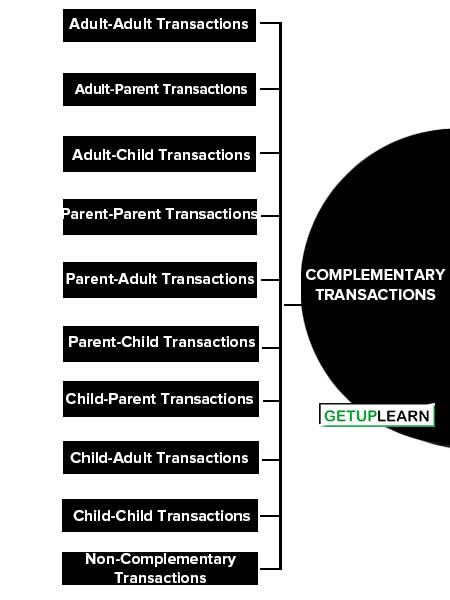
Adult-Adult Transactions
Both individuals are transacting from an Adult ego state and the stimulus and response are based on logical thinking and rationale. This kind of transaction encourages problem-solving. treats people as equals and reduces the chances of emotional conflict between people.
This type of communication is considered the most ideal and most effective at work. Figure 1 explains Adult-Adult transactions.
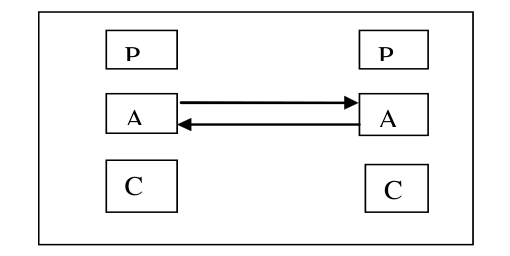
Adult-Parent Transactions
In the Adult-Parent ego state, the manager speaks from the Adult ego state, which is rational and backed by rules and regulations while the employee speaks from the Parent ego state, which displays an advisory behavior.
Parent ego state (of employee) will try to control and dominate the manager and their relationship is not likely to be cordial in the long run. The employee may even develop a hostile attitude toward the manager. Figure 2 explains the Adult-Parent transaction.
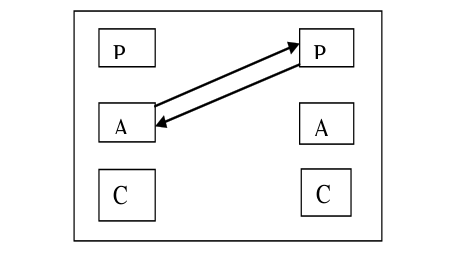
Adult-Child Transactions
This type of transaction is effective if the Child’s ego is of the little professor category, in which employees can bring creativity to work.
The manager has to keep guiding and tolerating the childlike behavior of employees which is characterized by less control and a lot of fun and enjoyment, which may not be productive for the organization. Adult-child ego transaction is shown in Figure 3.
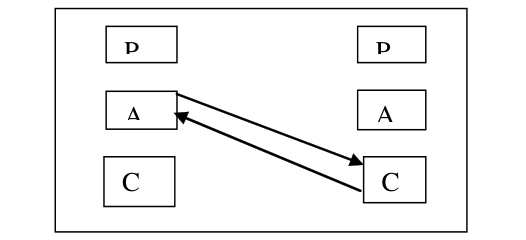
Parent-Parent Transactions
A parent ego state is characterized by a cautious attitude, rewards, praise and punishment, and adherence to rules. If both the manager and employee have the above characteristics of the Parent ego state, the stimuli and response will be dominating from either side (See Figure 4).
While the manager would put forth his/her ideas, the employee would reject them and put up a fresh idea, and that he/she would want to be accepted by the manager. Under such circumstances, the manager will have to adopt a Nurturing Parent ego state for the transaction to be productive and the communication to be effective.
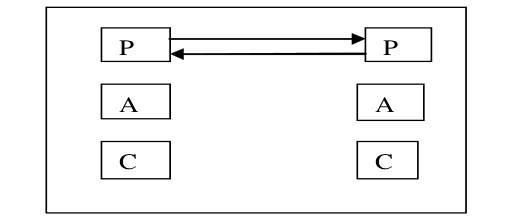
Parent-Adult Transactions
In this case, the manager is transacting from the Parent ego, while the employee responds from the Adult ego state. The rational and logical thinking on the part of the employee will be cut down by the Parent ego state of the manager.
A good working relationship between the two parties may not last long in such transactions, and ideally, any one of the two will have to switch over to the corresponding ego state for the relationship to continue.
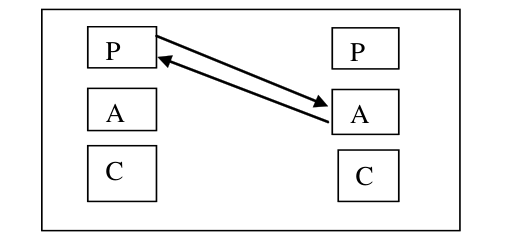
Parent-Child Transactions
In such transactions, the manager speaks to an employee as Parent to Child and the employee responds as Child to Parent (see Figure 6). Normally if a supervisor initiates a transaction in a Parent-to-Child pattern, the employee tends to respond from the Child state and looks forward to advice, guidance, and assistance from the manager at each stage of any work assigned.
This transaction yields results in situations in which the manager will get the work done from subordinates by advising and guiding them, and by rewarding them for good performance and punishing them for non-performance.
If the supervisor’s behavior is dominated by this pattern. It may lead to interpersonal and group effectiveness. Unfortunately, Parent-child transaction in a superior-subordinate relationship tends to frustrate the manager because he/she may develop the feeling of controlling an inefficient team that constantly needs guidance.
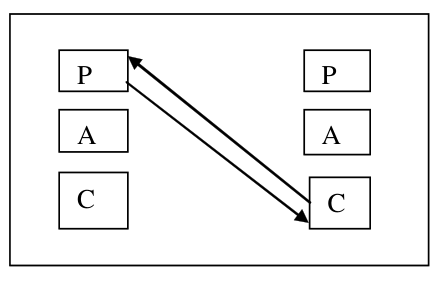
Child-Parent Transactions
Transaction in which the manager has a Child ego state and the employee has a Parent ego state is not a very effective style of communication. In such a transaction, the manager elicits a childlike reaction and the employee would control the manager.
The manager would always identify employees as threats and would look forward to their advice from time to time. The organizational environment will be laissez-faire and there can even be instances of managers being ridiculed and looked down upon by subordinates. Figure 7 explains this transaction.
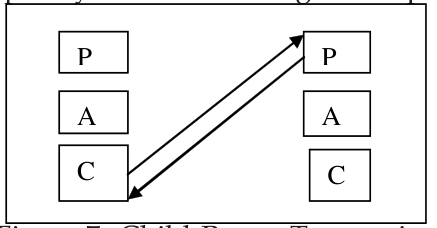
Child-Adult Transactions
When a manager acts from a Child ego, employees who want to work rationally from an Adult ego state would be jeopardized as decisions taken shall be based on whims and fancies, and even emotions (see Figure 8). No growth can be expected in the organization unless the ego state of the manager is changed.
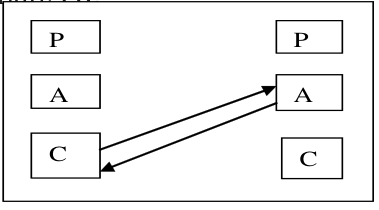
Child-Child Transactions
With both manager and employee acting from Child’s ego state (see Figure 9 ). such transactions do not fetch good results for the organization.
A manager with Child ego dominance is more of a liability to the organization, which may virtually be leaderless. With poor performance, low growth, and a lack of new ideas, there would be an air of lethargy all around.
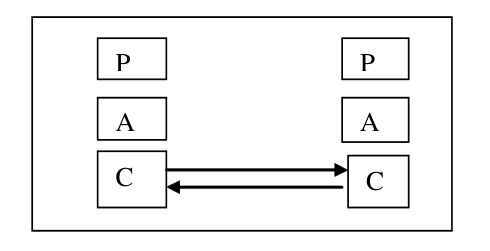
Non-Complementary Transactions
Non-complementary transactions, or crossed transactions, are those transactions in which a sender sends a message on the basis of his/ her ego state, but the response is from an incompatible ego state of the receiver. Such transactions occur when the stimulus and response lines are not parallel, as shown in Figure 10.
In this example, the supervisor tries to deal with the employee on a Parent-to -Child basis, but the employee responds on an Adult-to-Adult basis. When crossed transactions occur, point out John Newstrom and Keith Davis, communication tends to be blocked and a satisfactory transaction is not accomplished. Conflicts often follow soon afterward.
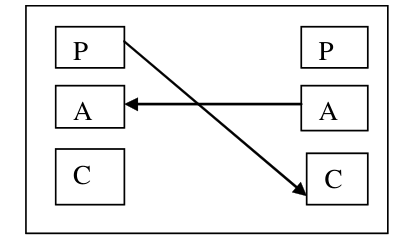
Ulterior Transactions
Ulterior transactions are the most complex transactions because they involve more than two ego states working simultaneously with double meaning in the stimulus. This type of transaction is very common in diplomatic circles when you say something but mean something else.
Needless to say, this type of transaction where the ulterior meaning is different is dangerous and should be avoided by all means as it created misunderstandings at the workplace.
